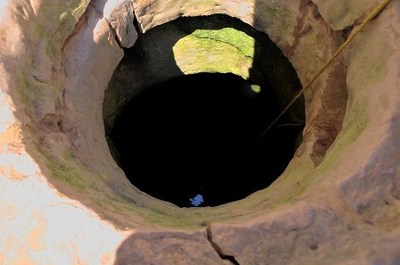
Where uncertainty lies! Photo (C) Ibrahim Chalhoub
The summit brought together the world’s leading energy figures under the theme of “2011, a Year of Change for the Energy Industry?”
Significant events occurring around the globe combined with economic uncertainty have affected the energy sector over the past 2 years. However, 2011 was a year where uncertainty reached unparalleled levels, which resulted in an increase in uncertainty in the outlook for the sustainable supply and use of energy on a worldwide level.
“The developments in the Middle East and North Africa region and the tragedy at Fukushima have further added to the pressure to adapt and represent a significant set-back in solving the global energy challenges”, said Christoph Frei, Secretary General of the WEC.
In fact, Fukushima’s accident made many countries review their utilization of nuclear energy in order to ensure a smooth move toward other sources of energy. Germany, for instance, decided to program the halt of its last nuclear reactor in 2022, relying mainly on carbon capture and sequestration which will be supposed to cover about 80% of its energy by 2050. Other European countries have different perspectives, like France which keeps on deriving about 78% of its electricity from nuclear plants.
This lack of significant progress towards an agreement is keeping this issue as the dominant critical uncertainty.
The Libyan oil issue raised by the turmoil of the political spring in the Middle East / North Africa region has largely affected energy markets. It is also worthwhile noting that political instability is on the rise in that part of the world, which further leads to uncertainty in the energy sector.
Pierre Gadonneix, Chairman of the WEC contributed through a look to the upcoming years: “It is in the nature of the energy sector to be able to cope with new uncertainties each year. Therefore we must now make all our efforts to build a world energy system resilient to all changes and accidents… To create such a system we must give investors the long term signals to invest now in diversified forms of energy, in infrastructures, in energy efficiency and in R&D to prepare for the future."
With the increase in the risks from physical accidents over regulatory uncertainties to financial concerns associated with substantial solutions managing previous solutions should have an important part of the agenda of the WEC.
On the other hand, some alternatives like electric vehicles and biofuels available in Latin American countries might have a greater role in meeting global energy needs.
Our constantly changing world keeps on surprising us with sudden screams launched by nature every now and then to return to the state of origin, the state of equilibrium. What will the situation of energy be on the date of the next Summit?
Video below about world energy crisis as explained by a creative teacher to his students
Significant events occurring around the globe combined with economic uncertainty have affected the energy sector over the past 2 years. However, 2011 was a year where uncertainty reached unparalleled levels, which resulted in an increase in uncertainty in the outlook for the sustainable supply and use of energy on a worldwide level.
“The developments in the Middle East and North Africa region and the tragedy at Fukushima have further added to the pressure to adapt and represent a significant set-back in solving the global energy challenges”, said Christoph Frei, Secretary General of the WEC.
In fact, Fukushima’s accident made many countries review their utilization of nuclear energy in order to ensure a smooth move toward other sources of energy. Germany, for instance, decided to program the halt of its last nuclear reactor in 2022, relying mainly on carbon capture and sequestration which will be supposed to cover about 80% of its energy by 2050. Other European countries have different perspectives, like France which keeps on deriving about 78% of its electricity from nuclear plants.
This lack of significant progress towards an agreement is keeping this issue as the dominant critical uncertainty.
The Libyan oil issue raised by the turmoil of the political spring in the Middle East / North Africa region has largely affected energy markets. It is also worthwhile noting that political instability is on the rise in that part of the world, which further leads to uncertainty in the energy sector.
Pierre Gadonneix, Chairman of the WEC contributed through a look to the upcoming years: “It is in the nature of the energy sector to be able to cope with new uncertainties each year. Therefore we must now make all our efforts to build a world energy system resilient to all changes and accidents… To create such a system we must give investors the long term signals to invest now in diversified forms of energy, in infrastructures, in energy efficiency and in R&D to prepare for the future."
With the increase in the risks from physical accidents over regulatory uncertainties to financial concerns associated with substantial solutions managing previous solutions should have an important part of the agenda of the WEC.
On the other hand, some alternatives like electric vehicles and biofuels available in Latin American countries might have a greater role in meeting global energy needs.
Our constantly changing world keeps on surprising us with sudden screams launched by nature every now and then to return to the state of origin, the state of equilibrium. What will the situation of energy be on the date of the next Summit?
Video below about world energy crisis as explained by a creative teacher to his students










 Journée de l'Oiseau à l'arboretum Marcel Kroenlein de Roure
Journée de l'Oiseau à l'arboretum Marcel Kroenlein de Roure








